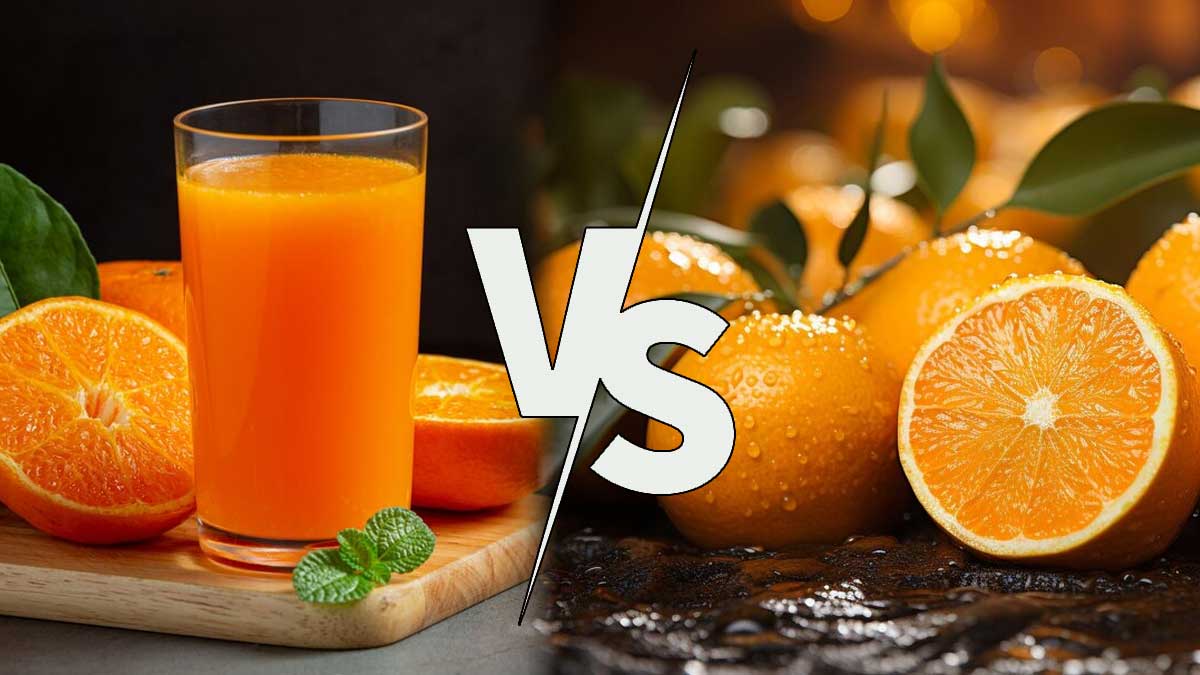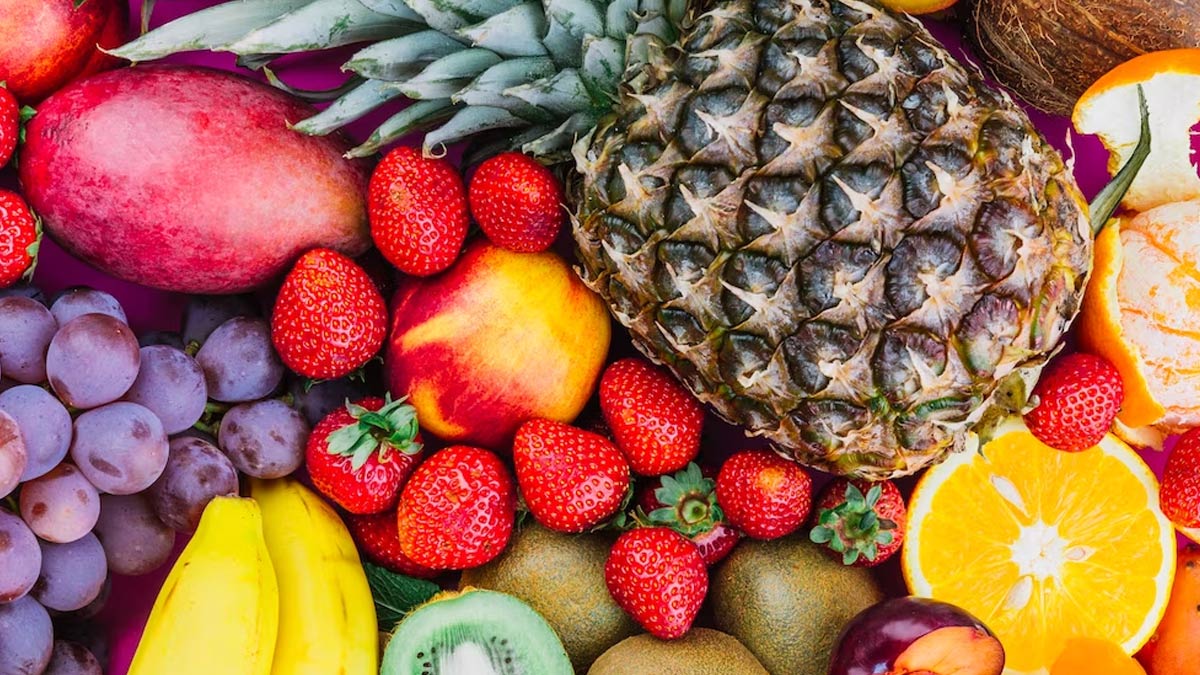
The discussion of what you should choose for your health goals, whole fruits or fruit juice is a never-ending debate. While it is common knowledge that whole fruits are better than fruit juice, do you know the exact reasons why? To decode this age-old debate, the team of OnlyMyHealth spoke to Pooja Shah Bhave, Consultant Clinical Dietician and Diabetes Educator.
Table of Content:-
Whole Fruits Vs Fruit Juice
“Freshly eaten whole fruits are most abundant in micronutrients like vitamins and minerals,” confirmed Bhave. Listing a few reasons why whole fruits are a healthier choice than fruit juice, Bhave commented:
- Loss of Vitamin C: Making fruit juice in a juicer or mixer-grinder generates heat which inevitably causes a loss of Vitamin C.
- Excessive Carbohydrates: When we juice a fruit or make its smoothie at home without adding any additional sugar, we end up consuming more than one fruit. For example, one glass of orange juice needs about 2-3 medium to big size oranges. However, it is recommended to consume only about one fruit of a certain type at a time. One fruit is generally 100-150g and provides about 10-20g of carbohydrate. But in the form of juice, we may easily end up having 30-50g of carbohydrates in a glass.
- Spike In Blood Sugar Levels: Whole fruits are full of fibre, thus they take time to chew, digest and get absorbed. This causes blood sugar levels to rise slowly. But when we consume fruit juice, we don’t have to chew it and it enters our digestive tract and gets digested quickly. This enables the glucose and fructose from the fruit to get absorbed at a quicker rate which results in a higher spike in blood glucose levels. That is the reason fruit juice is strictly not advised for diabetes patients.

Bhave said, “Even if we don’t remove fibre from the juice, the fibre will have only a slight impact on slowing down digestion and absorption of sugars in the fruit.”
“Most people prefer to strain the fibre from the fruit juice and add 1-2 teaspoons sugar which is very bad. The worst type of fruit juices is the ready-to-consume packed ones or dehydrated juice powders which are devoid of any vitamins, minerals, or fibre. The packed ones are also concentrated in sugar which is labelled as ‘fruit concentrates’ and contain a lot of preservatives,” warned Bhave.
Best Way To Consume Fruits
Along with labelling whole fruits as the healthier option, Bhave also shared the best way to eat fruits. She said, “Fresh fruits once peeled or cut should be immediately consumed to get maximum benefit from them. If we consume fruits especially citrus fruits like oranges, sweet lime, Malta, kiwi, dragon fruit and lemon after a while, some amount of Vitamin C is lost from it.”
She added, “Yes, some big fruits like watermelon, papaya, and pineapple need not be consumed at one time. They can be refrigerated and properly covered once they are cut.”
How To Drink Fruit Juice?
Bhave recommended some fruit juices that are actually healthy. She listed:
- The best juice that we can consume is coconut water which is a natural juice.
- Amla juice, lemon water and the juice of wood apple, a seasonal exotic fruit are also healthy choices.
- Those who are non-diabetic can occasionally consume sugar cane juice.
- Vegetable juice unstrained with fiber is a healthier alternative to fruit juices.
- Adding only half a fruit to vegetable juice, making sure that you do not strain the mixture is a better option than simply fruit juice as the blood sugar spike is comparatively lower.
- If you want to have fruit juice the best way to consume it is unstrained without removing the fibre.
Also Read: Sugary Drinks Including 100% Fruit Juices May Increase Cancer Risk, Says Dr Choudhury

What To Do With Leftover Pulp From Juicing?
Sharing a few ways to use the leftover parts of a fruit, including the fibre or pulp after blending a fruit, Bhave listed:
- Dehydrate orange or sweet lime fibre. You can also add the dried peels to it. Grind it together to make a powder and wash your hair with it.
- Fibre from pulpy fruits like papaya, musk melon, or watermelon, we can apply it to the face as a natural scrub and cleanser.
- You can also use the fibrous pulp to make chutney or to add it to cooked vegetables.
- Some seeds like musk melon seeds can be dried, peeled and consumed as they are healthy fats and good for the skin.
When Is Fruit Juice Better Than Eating Fruit?
Lately, Bhave talked about the fact that fruit juice may actually be a more convenient and safe option for some people. She listed:
- People who are unable to chew or swallow foods like in the case of esophagus or stomach cancer.
- People who cannot digest fruits or tolerate fibre.
- Very old people without teeth or those who have dentures.
- Very young infants.
- People with kidney stones or urinary tract infections where it is recommended to have more liquids.
- People suffering from diarrhoea are often recommended to have strained fruit juices like pomegranate, apple juice, or lemon water without sugar.
Also Read: From Sugary Cereals To Fruit Juices: Expert Lists Foods To Avoid For Breakfast
Bhave concluded that generally speaking eating fruits is better than blending them into fruit juice. However, in certain medical conditions where fruit juice is recommended, there are things to keep in mind. She recommended adding soluble fibre supplements to the juice. Even in the case of fruit juice, the first preference should be fruit pulp, curd smoothie, fruit custard, or mashed fruits.
Also watch this video
How we keep this article up to date:
We work with experts and keep a close eye on the latest in health and wellness. Whenever there is a new research or helpful information, we update our articles with accurate and useful advice.
Current Version